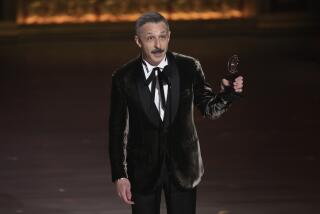MANHATTAN TRANSFER, CLEO LAINE WIN IN JAZZ
In an achievement unprecedented in the vocal jazz history of the Grammys, the Manhattan Transferâs âVocaleseâ album figured in victories in three categories.
The awards went to the members of Transfer for best vocal group performance; to Jon Hendricks and Bobby McFerrin (best male jazz vocal), who collaborated on the track âAnother Night in Tunisiaâ from the album, and to McFerrin again, along with Cheryl Bentyne, for their arrangement of the same cut.
For the record:
12:00 a.m. Feb. 27, 1986 FOR THE RECORD
Los Angeles Times Thursday February 27, 1986 Home Edition Calendar Part 6 Page 5 Column 1 Entertainment Desk 1 inches; 26 words Type of Material: Correction
A story in the same edition incorrectly said more than 120 jazz aritsts took part in an eight-minute jazz performance during the Grammy awards show. Only about 20 jazz artists performed.
Like all but one of the jazz awards, these victories were part of the pre-telecast program at the Shrine, as were all the jazz categories except for the best instrumental soloist award, announced on the air by Maxine Sullivan and Toshiko Akiyoshi and given to Wynton Marsalis.
The other jazz surprise was a belated first win for Cleo Laine. Now appearing on Broadway in âThe Mystery of Edwin Drood,â the British actress-singer won for her âCleo at Carnegie: The 10th Anniversary Concert.â
Wynton Marsalis has the instrumental combo category locked up: His âBlack Codes From the Undergroundâ earned him his third award in that category in a row, in addition to his soloist award. David Sanbornâs âStraight From the Heartâ won for best jazz fusion performance, ironically a category won in 1980 by Manhattan Transfer.
Something of a shock was the dual prize to John Barry and Bob Wilber for best big band jazz instrumental. Barryâs contributions to âThe Cotton Clubâ movie sound-track album that won them both this award were not remotely jazz.
Meanwhile, Akiyoshi, nominated eight times, remains in the always-a-bridesmaid department with her orchestra, which in the past several years has won almost every big band jazz prize given by music publications.
A borderline jazz victory was achieved by a former Buddy Rich sideman, jazz saxophonist Ernie Watts, whose album, âMusician,â won as best R&B; instrumental performance.
A lifetime-achievement Grammy was handed to Benny Goodman, following a splendid set of vintage film clips showing various stages of his jazz career. Also announced was a special Presidentâs Merit Award for John Hammond, the veteran talent scout who played a major role in Goodmanâs career, and who was prevented by illness from attending.
This year, a jazz interlude attempt to squeeze more than 120 artists into a three-part sequence totaling eight minutes of music. Arguably, it was worse than nothing.
The segment was organized in Noahâs Ark fashion, with two of everything: trumpets, saxes, pianos, basses, drums, vibraphones, male singers, female singers, plus Manhattan Transfer and B.B. King.
Instead of giving a few artists a chance to express themselves, NARAS organizers brought on the likes of Dizzy Gillespie, Herbie Hancock, Kenny Burrell, Stanley Jordan, Buddy Rich, Tony Williams, Bobby Hutcherson and others for a hurried jam session on 40-year-old tunes that offered little chance to establish their identities. Even Sarah Vaughan had less than 30 seconds to herself.
Vibist Gary Burton (who resigned from NARAS many years ago) said: âIt was hackneyed; we couldnât show whatâs happening in jazz today.â
On the other hand, Joe Williams, among others, said, âIt was TV exposure of a sort--certainly better than not having us here.â
More to Read
The biggest entertainment stories
Get our big stories about Hollywood, film, television, music, arts, culture and more right in your inbox as soon as they publish.
You may occasionally receive promotional content from the Los Angeles Times.










